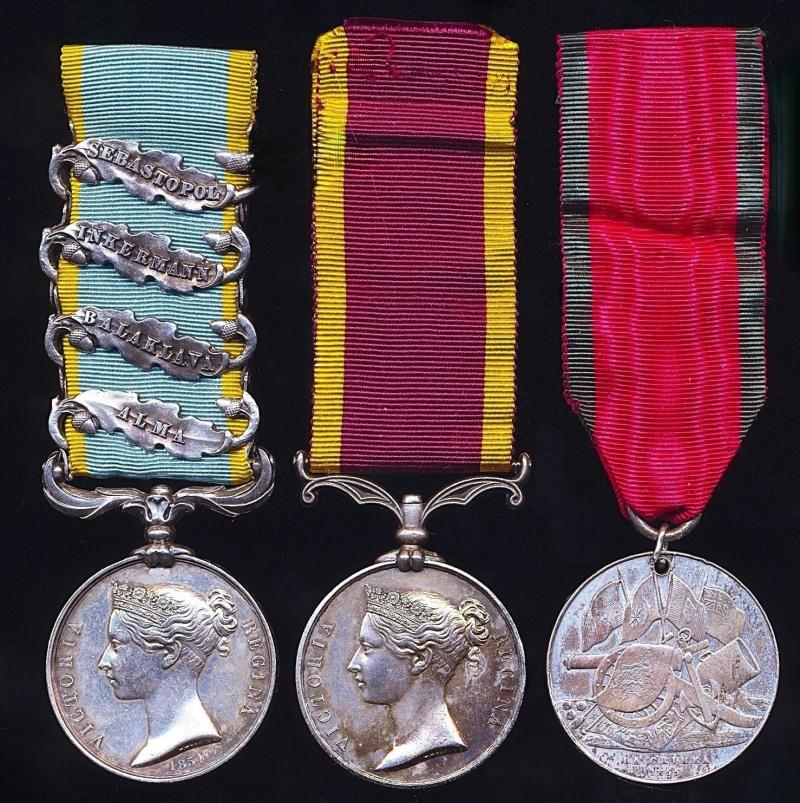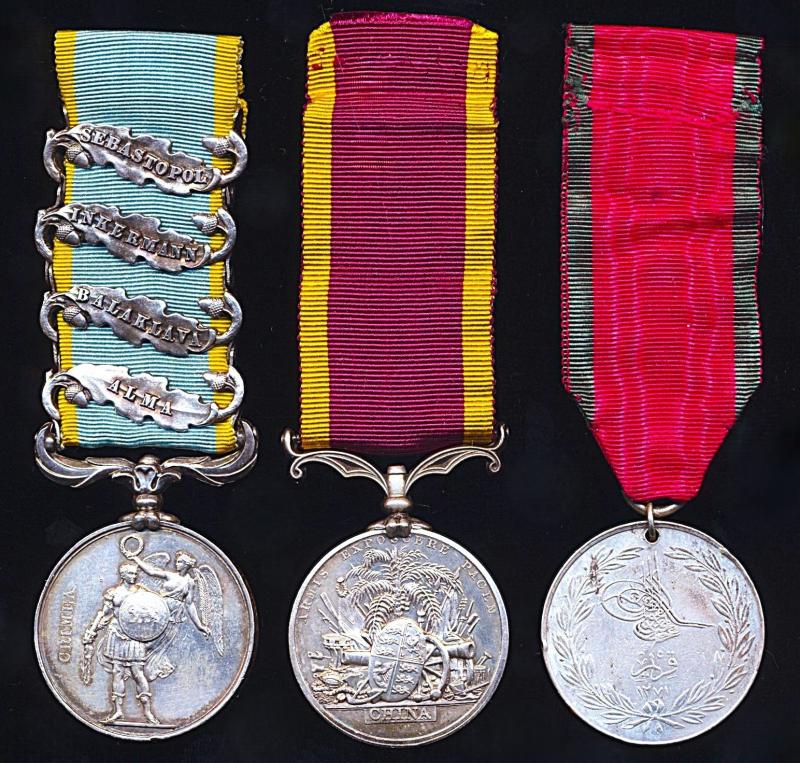An Etonian China Casualty - who fought 'Tartars' - and a 'Hand-Picked' officer by Chinese Gordon for his 'Ever Victorious Army': Lieutenant-Colonel Augustus Foulkes Cookesley, 'Ever Victorious Army', late D.A.C.G. Commissariat Department
- Crimea. Alma, Balaklava, Inkermann, Sebastopol (A. F. Cookesley. Depy. Asst. Comy. General)
- China Medal 1857-60. No clasp (D. Ast. Comy. Genl. A. F. Cookesley.)
- Turkish Crimea Medal 1855. Sardinian reverse. Fitted with rings for suspension
Naming: The Crimea medal is engraved in serifed capitals by 'Hunt & Roskell'. The China medal is officially impressed, and the Turkish medal is un-named as issued
Medals & Clasps Verification: All 3 x medals and all clasps verified as entitled per the below cited official
sources:
- Crimea Medal 1854-56 with 4 x clasps: Hart's 'The New Annual Army List and Militia List for 1860' refers
- China Medal 1857-60. No clasp: WO 100/40
- Turkish Crimea Medal 1855: Hart's 'The New Annual Army List and Militia List for 1860' refers
Note: The recipient was not awarded a Pekin 1860 clasp, as he was not eligible / entitled per the very specific award criteria for the China series of clasps, that required personnel to have served 'under fire' - he did however enter Pekin after its capture - and had been involved in close combat 'prior' to its capture while on the march to Pekin.....
Commissariat Clerk Augustus Foulkes Cookesley was promoted and appointed Deputy Assistant Commissary General on 1 January 1855. He served with the Head Quarters of the army throughout the Eastern campaign of 1854-55, including the battles of Alma, Balaklava, and Inkermann, and siege of Sebastopol (Medal and four Clasps, and Turkish Medal). He afterwards served on the Cape of Good Hope and China stations, where he was at the taking of Pekin; and finally joined Anglo-Chinese contingent under Major Gordon (later ‘Chinese Gordon’ of Khartoum fame). He died suddenly of Asiatic cholera at Quinsan, China, on 16 July 1863, aged 30, and is buried in Shantung Road Cemetery. He was the son of the Rev. W. G. Cookesley, Incumbent of St Peter’s, Hammersmith
With regards to his earlier Crimea Service, Cookesley is frequently mentioned in contemporary newspapers and journals
Important: Augustus Cookesley, is confirmed as having fought in an engagement against 'Tartar Cavalry' during the Second Opium War, and following the conclusion of that war, is confirmed as being 'Hand-Picked' by 'Chinese Gordon', and appointed as one of only a handful of British Officers attached to the colourful and largely foreign mercenary 'Ever Victorious Army'
The 'Evening Freeman' newspaper issue of 28 November 1860, contained an article titled 'The War In China' from a correspondent in the field on the march to Pekin, that refers to Cookesley's combat against the 'Tartars':
Quote,
THE WAR IN CHINA
FROM A CORRESPONDENT
CAMP NEAR TANG-CHUNG, EIGHT MILES FROM PEKIN, 22ND SEPTEMBER.......
......In consequence of the scarcity of rations &c, caused by the desertion and unwillingness of the inhabitants to supply us, Captain Goodall of the Military Train, and Deputy-Assistant Commissary-General Cookesley, with a small party of about sixteen men of the Military Train, King's Dragoon Guards and Irregulars, proceeded to search the country to the extent of six miles round the camp for cattle &c, on the 16th instant, when they fell in with a body of the Tartars; they attacked each other, the result being, that about seven Tartars were killed, but none on part of the foraging party
Unquote.
After 'Colonel' Charles Gordon, replaced the American Mercenary generals, as leader of the Chinese Emperor's 'Ever Victorious Army', he personally selected Augustus Cookesley for the important appointment of Commissary General of that force, and granted him the rank of local 'Lieutenant-Colonel'. The book from which the below quoted extract is taken is - The 'Ever-Victorious Army': A History of the Chinese Campaign under Lt. Col. C. G. Gordon and of the Suppression of the Tai-Ping Rebellion (Andrew Wilson, 1868)
Quote,
A MUTINY IN THE FORCE
Finding it necessary also to have some officer of rank over the commissariat and military stores, he selected Deputy-Assistant Commissary-General Cooksley, an excellent officer, for that duty, and gave him the rank of Lieutenant-Colonel in order that he might speak with authority to the majors commanding the different regiments, who were apt to be troublesome when rations were issued.
These efforts to improve the discipline of this rather anomalous force were not allowed to pass without violent opposition, threatening at one time to pass into open mutiny. When Lieut.-Colonel Cooksley's appointment was made known, and just when the force was ordered to march against Quinsan, all the majors requested an interview with the commander, at which they complained of an officer of the English army being placed over them, and demanded for themselves the same rank and pay as the new lieutenant-colonel. This was at once refused, on which they retired, and soon after sent in their resignations, with the cool request that these should be accepted at once, but that they should be allowed to serve on the approaching expedition. In answer to this Colonel Gordon at once accepted their resignations, and refused to allow them to serve on the expedition ; but the position in which he was placed was a very critical one. The force had been ordered to march at daybreak next morning, the 24th May, but at 8 a.m. only the commander's body-guard had fallen in ; and the officers who had been placed in command came to report that none of the other men would do so.
Unquote
A superb group of medals to a British Officer who saw considerable service in China in the Second Opium War, and latterly as one of only a handful of British Officers to serve in the Taiping Rebellion
Condition: GVF
Code: 24570
1895.00 GBP






